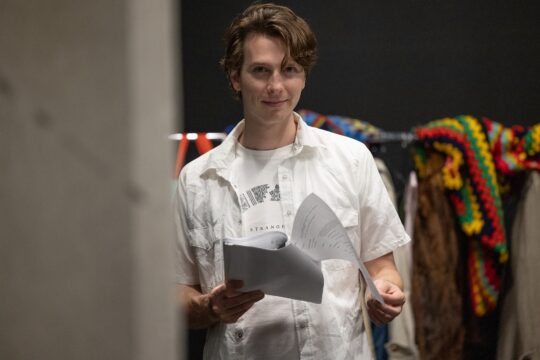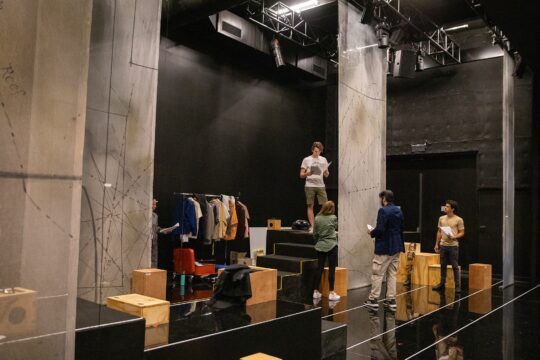Q&A with Belloo Creative
Interview with Caroline Dunphy and Katherine Lyall-Watson, Co-Artistic Directors of Belloo Creative, ahead of their production BOY, LOST in the Diane Cilento Studio.

Can you start by telling us a bit about Belloo Creative and its history?
We started Belloo in 2013, when we first came together to create the stage production Motherland. Amazingly, although we’d worked in the same city for years, we’d never met before Motherland. We realised that there was something magical in the way our individual practices and processes combined and decided to form Belloo — a female-led, independent theatre company creating works that bring body and text together.

How did you first discover the story of Boy, Lost?
Katherine: I read the book when it first came out and knew straight away that this was a story that needed to keep being told. I pitched the idea to Wesley Enoch when he was Artistic Director at Queensland Theatre and he commissioned it in 2015 — can’t quite believe it’s been seven years in the making!
In your own words, how would you describe the story?
Boy, Lost is the story of a boy ripped from his mother’s arms as a baby and his determination to find her. It’s also the story of Australia in the 40s and 50s, when children were taken from their families and put into institutions with no concept of the damage it was doing to them.

What do you hope audiences take away from this story?
We hope they come away with the same sense of wonder that we have — wonder at the tenacity of the human spirit and our ability to find joy and connection, even after trauma. And with the sheer exhilaration of seeing a performance where everyone involved is giving it their all to make the sort of art that stays with you. This work has a strong blend of all design elements interwoven, we hope together they can create a lasting and deep impression for our audiences.
Is there a particular method of direction that you find yourself using most in the rehearsal room?
Caro: I am starting with the actor and their body (with voice) in the space as part of an ensemble. The ‘actor’ is written into the play as the story's narrator, so this is of core importance. How the actor occupies and focuses the space for us determines our comprehension of the story. The set is non-literal and the playing style is heightened with elements of magic realism so this allows us to launch into and explore hugely imaginative possibilities in stylistic ways.
I am drawing on techniques I have learnt and training in various methodologies particularly those of the Suzuki Actor Training Method and experimental forms of theatre with Frank Theatre, as well as experience in more realism-based approaches.
I guess it’s a true hybrid working method in approach and form as we play through multiple roles and characters spanning time and era in heightened design territory. It’s a type of dance that we’re all embracing and enjoying as a team, including the designers.

We are incredibly excited to be hosting the Australian premiere of Boy, Lost. What has been your favourite part about developing this production at Queensland Theatre?
Katherine: The gift of building the work in the theatre where it will be presented — this is the most profound opportunity and allows us to take risks that we couldn’t in a rehearsal room.
Caro: Working closely throughout the process with the designers as well as the actors collectively brings an intricacy to the theatre process and an ensemble feel that I truly love.
Can you tell us about a moment in the story that you are most excited for our audiences to experience?
Katherine: All of it — from beginning to end — you’ll be strapped in on a rollercoaster ride and we can’t wait to share it with you.
Why do you think this show is relevant to our audiences in 2023?
Katherine: We’ve all been through a lot over the last two years and sometimes the world seems a little bleak. Boy, Lost will transport you, fill you with hope and give you a view of a much bigger picture.
Caro: The power of theatre is the experience of storytelling but also meeting and catching up in the flesh, celebrating these shared experiences.

Are there parts of the show that resonate with your own life?
Katherine: Nine years ago, my husband found out he had an older brother. Like so many unwed young women, his mother was forced to give her baby up for adoption and she didn’t find him again until she was 81 years old. She passed away last year, but the joy and tenderness she and Geoff experienced for the eight years they had each other, changed all of us in the family.
Caro: In terms of story, coming from a single-parent family of five children, the feeling of having ‘lost’ a family member is very real and over the years I’ve so often wondered how my mother really coped with losing her oldest son. In terms of this show, I feel we are celebrating the work of many artists, with Kris Olsson our memoir writer at the helm, this particular play allows us as makers to work in more connected ways than usual. A family of artists bringing a production about family to life couldn’t be more fitting for me and I am incredibly grateful that theatre and its artists are back and able to produce work again.
What sort of discussions do you hope Boy, Lost prompts its audience to have after they see the show?
Katherine: Discussions about the sort of nation we want to be, about how we make sure children and families are safe in their homes and how we learn from the mistakes of the past instead of repeating them.

We’ve heard you’ll be weaving music theatre and physical storytelling into the show, can you share a little about what this will look like, and what impact you hope it will have on the story?
Caro: Working closely with Katherine through the later drafting process, we spoke about song as voice and music to support that in the emotional journeying as well as lifting into the atmosphere. We’re linking that with the sound effects written into the play. We are essentially dealing with techniques of connecting and elevating the performer and story through a heightened and fictional truth, and meeting the audience.
The designers and I worked closely in the early stages to make decisions together about the form and conventions of the work. We decided to delve into some riskier territory interweaving all the elements and exploring as we go collectively to enhance the fluidity and construct of Katherine’s writing. Some of those things come with pure experimentation on the floor with the actors, physicality and movement. We are happy to say our instincts and decisions feel right as we move into our third week of rehearsals and hope that the story lifts into an authentic and highly imaginative world like only theatre can. The music, and fluidity of physical movement with the design brings this story of the family to us in ways where memory plays beautiful and brilliant havoc.
This show has been a long time coming, can you tell us about one of your favourite parts of the development process?
Katherine: Years ago, when I was writing the second draft of this play, I was stuck at a moment in a scene where I could picture the characters, but I couldn’t make them speak. Nothing that I wrote felt right. As I stared at the imaginary actors in my head, one of them lifted her face and started to sing. I had never written a play with music before, but I knew in that moment that Boy, Lost would have songs. Working with Morgan Francis to write the music for those songs has been exceptional. Caroline and I went to Sydney to meet with Peter — the lost boy from the title — and played him some of Morgan’s songs and he wept. The music had captured his feelings from all those years ago so perfectly.
